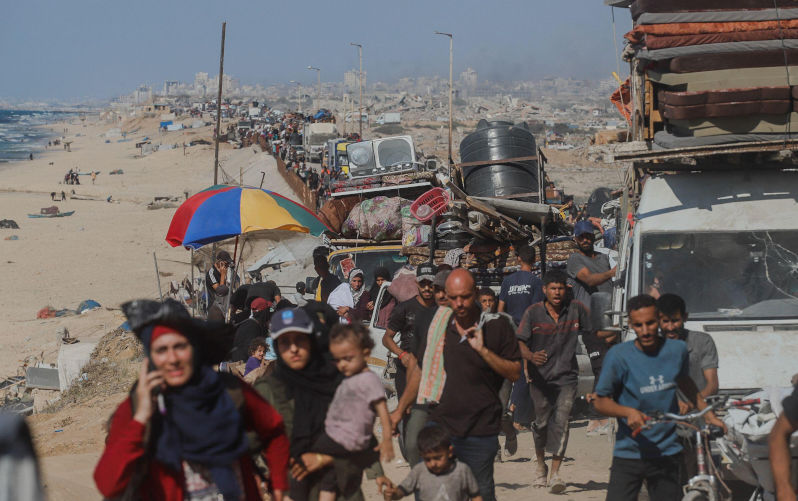Why the trauma community must break its silence on Gaza
November 26, 2025
As Gaza reels from unimaginable physical and psychological harm, the global trauma healing community has remained largely silent. Breaking that silence is essential if therapeutic work is to remain honest, ethical and grounded in the reality clients bring into the room.
The bombing has diminished, if not fallen altogether silent – so now the work can begin of healing the immense damage to life and limb, along with the natural and built environment, amid the ruins of Gaza. But these are just the visible scars. The legacy of Israel’s genocide will be re-experienced in psychological trauma, resonating through the lives of the people and, indeed, subsequent generations. Dr Ghassan Abu-Sittah, a British-Palestinian plastic and reconstructive surgeon, has called it “the biggest case of child abuse in modern history”.
Of all the milieux where it might be expected for this legacy to be a dominant theme of urgent discussion, with a focus on how therapeutic help can be given, the global trauma healing community should surely be prominent. And yet it has remained almost completely mute. In one of the biggest gatherings in the field, many thousands joined a seven-day Collective Trauma Summit last month, before the Trump-brokered ceasefire, with over 40 speakers and panels. Generalised terms such “trauma,” “conflict”, “suffering,” “social change” and “transformation” were prominent in the presentations and discussions. Specific mention of Palestine came there none.
As a psychotherapist specialising in EMDR (Eye Movement Desensitisation and Reprocessing), which I combine with Internal Family Systems (IFS) therapy, I’ve met the all too familiar objections when raising the issue among colleagues, on email listservs and in discussion spaces: “it’s not a genocide, what genocide, where’s the evidence?”; “you’re upsetting people, you’re being political ”; “it’s not appropriate”; “it’s just propaganda”.
One of the world’s best-known experts on trauma is Gabor Maté, a retired medical doctor whose best-selling book, _The Realm of Hungry Ghosts_, offers insights and reflections from his decades working with hardcore addicts in downtown Vancouver. He’s also a Jewish survivor of the Holocaust in Hungary who has renounced his previous allegiance to Zionism and now calls for an end to the occupation of Palestinian territory. He’s the featured speaker at an upcoming online event, Breaking the Silence, conceived with the explicit aim of fortifying those in therapy who wish to challenge the censorship and identify contributions they can make to exposing the consequences of genocide. All funds from admission charges are being donated for medical and mental health support for children from Gaza.
Earlier, Maté had pulled out of the Oxford Transform Trauma Conference, held in September with 6,000 delegates, due to a family event. His slot was filled instead by the singer, Alanis Morissette, who is targeted by boycott activists over her decision to perform in Israel. Attendees rallied through a WhatsApp group and set up an impromptu event in the conference foyer in protest at the marginalisation of concerns arising from the onslaught on Gaza.
Maté is one of over five hundred signatories to a petition calling for the Collective Trauma Summit, and other events like it, to stop censoring the genocide. Dr Irma Allen, a researcher, educator, embodied facilitator, and trained mindfulness teacher, who launched the initiative due to her own frustrations about Palestine in this space, has written: “We believe silence, and misuse of language, in the face of atrocity is complicity… [it is] spiritual bypassing — a profound misuse of spiritual-therapeutic language to avoid confronting truth and enable ongoing cycles of denial, violence and oppression”.
Maté’s own comment when adding his name was: “Notwithstanding my friendship with and undiminished personal regard for leading figures taking part in this Collective Trauma Conference, I feel compelled to add my voice publicly to those calling for the healing/therapeutic community to acknowledge and to address the unspeakable collective trauma that has been for decades inflicted on the people of Palestine, and especially in the past two years. A trauma witnessed and grieved by millions around the world.”
It’s a truism of therapy that events in the world beyond will crop up, unbidden as it were, in our treatment rooms through the life experiences of clients.
Some I’ve treated over the past couple of years have been burnt out by their own activism. Others are horrified by the images of starving children on their television screens, or news about people being systematically shot in the head and chest, or incubators being turned off in a neonatal intensive care unit in Gaza. The latter was a memory image for an EMDR client here in Australia. Although she was, therefore, geographically distant from the violence, simply following such events via newsfeeds on her phone gave her nightmares.
So the topic cannot be avoided, even if we want to. Judge Navi Pillay, who was recently awarded the Sydney Peace Prize, said when launching her UN Independent Commission’s report on the genocide that “silence is not neutrality, but complicity”. At the award ceremony, she added that “no activism is too small” to contribute to peace with justice.
It’s time for those in therapeutic communities around the world – dedicated, as they should be, to alleviating trauma wherever they encounter it – to break the silence and raise the alarm over the psychological consequences of this enormity. That would be to live up to the aspiration for EMDR set by the pioneering psychotherapist, Francine Shapiro, who founded it: to use EMDR therapy to break the cycle of violence in the world.
The views expressed in this article may or may not reflect those of Pearls and Irritations.
Please support Pearls and Irritations with your tax deductible donation
This year, Pearls and Irritations has again proven that independent media has never been more essential.
The integrity of our media matters - please support Pearls and Irritations
For the next month you can make a tax deductible donation through the Australian Cultural Fund

